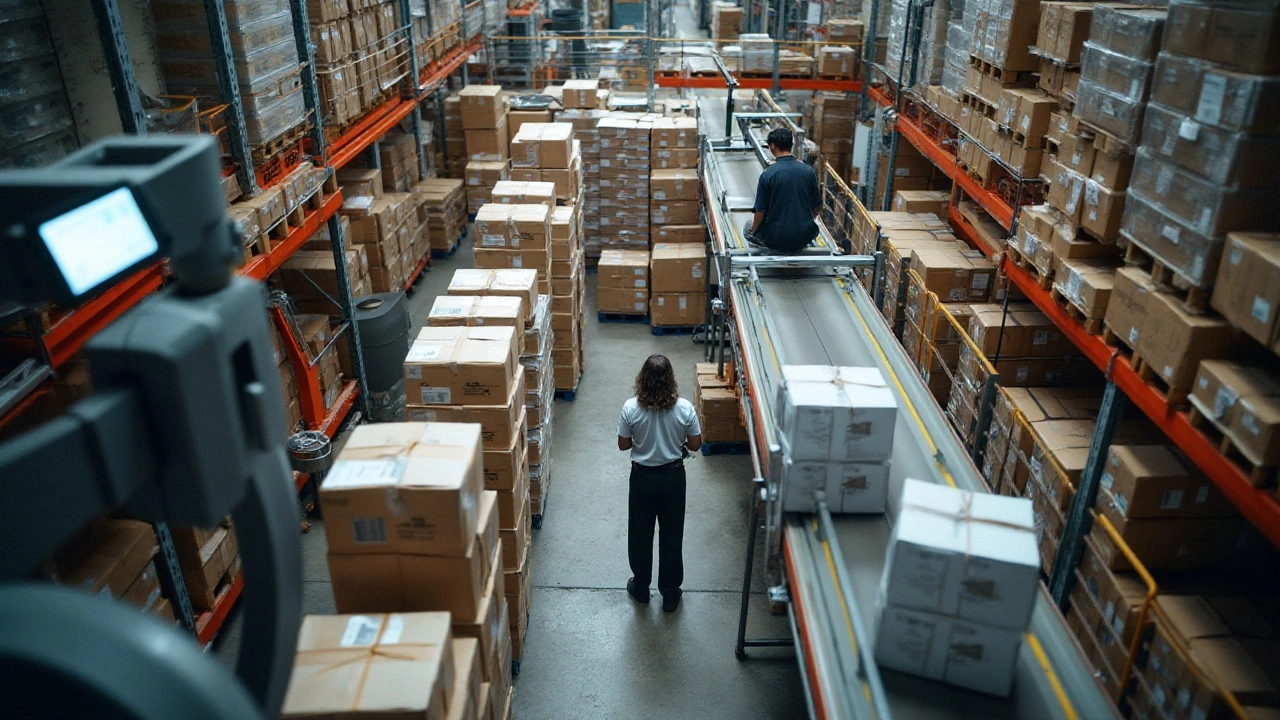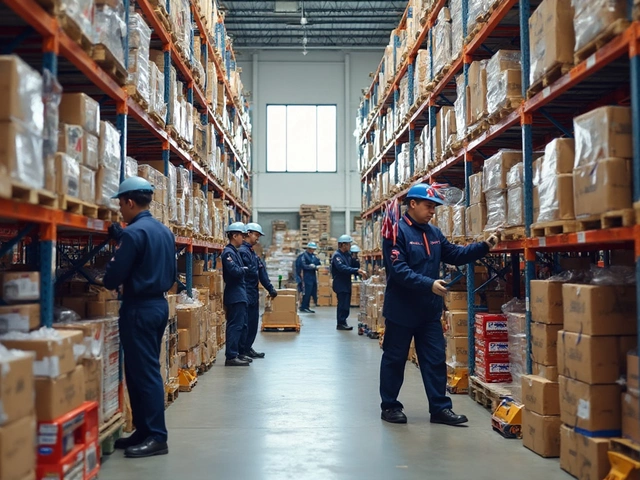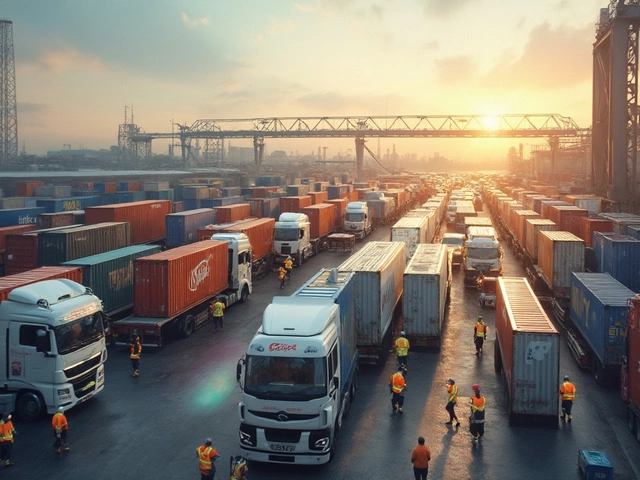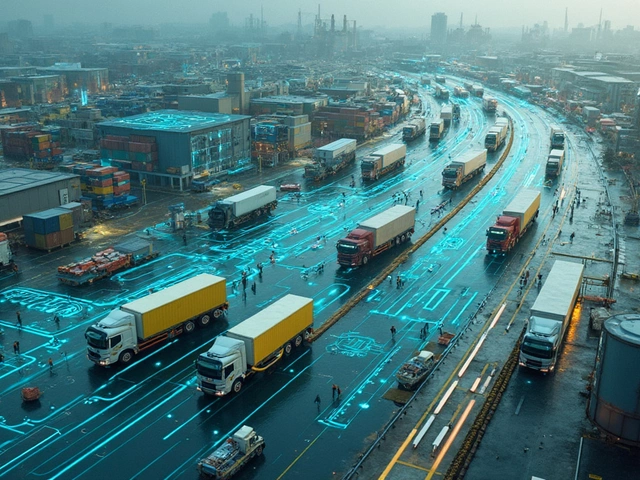The logistics sector, often described as the backbone of global trade, relies on a complex network of skills, technologies, and processes. Whether you're orchestrating the movement of goods or optimizing supply chain efficiency, a career in logistics offers diverse challenges and opportunities for growth.
Logistics professionals, or logisticians, draw upon a blend of analytical thinking, problem-solving capabilities, and technological savvy to manage and streamline operations. As you delve into this vibrant industry, understanding the essential tools and skills required can set the groundwork for a successful career.
This article unravels the key elements—skills, tools, career paths, and best practices—that are vital to flourishing in logistics. As the industry evolves with innovative trends and technologies, staying informed and adaptable is paramount for those aiming to excel.
- Core Skills for Logisticians
- Critical Tools and Technologies
- Exploring Career Paths in Logistics
- Enhancing Skill Set and Knowledge
- Future of Logistics and Emerging Trends
Core Skills for Logisticians
In the bustling world of logistics, professionals are expected to wear many hats, balancing their technical prowess with human-centric skills. At the heart of all operations lies a need for strong analytical abilities. This might sound straightforward, but it demands more than just crunching numbers. Logisticians should possess a keen sense of detail and an ability to interpret data to understand patterns and trends. The capability to swiftly analyze this data is critical for foreseeing logistical challenges and developing efficient solutions.
Communication skills are equally crucial in logistics. Whether you're coordinating with a team on the warehouse floor or negotiating with suppliers, clarity in conveying information ensures smoother operations. A well-articulated message can prevent misunderstandings that might cost time and resources. The ability to tailor your communication style according to the audience—be it clients, colleagues, or stakeholders—is what makes a logistician effective. As Collins’ Logistics Survey 2023 noted, "Seventy-eight percent of logistics managers attribute the success of their teams to their excellent communication and problem-solving skills."
Problem-solving is another core skill that logisticians must hone. In a field where unpredictable variables like weather disruptions or geopolitical issues can wreak havoc, the ability to think creatively and implement solutions on the fly is invaluable. Logisticians should be prepared to face complex scenarios with innovative approaches to keep operations running smoothly. Being proactive—identifying possible issues before they arise—can save enterprises significant resources in both time and money.
Supply chain management also calls for technical expertise in logistics software and systems. Understanding these tools, such as Transportation Management Systems (TMS) or Warehouse Management Systems (WMS), equips professionals to harness technology for optimum efficiency. A logistician's role is often deeply intertwined with digital technology, requiring continuous learning to stay attuned to the latest advancements. According to a 2022 industry report by TechLogistic Insights, companies that emphasized technical training for their logisticians saw a 20% improvement in supply chain efficiency within a year.
Organizational skills are non-negotiable in this profession. With multiple tasks requiring attention simultaneously, the ability to prioritize and manage one's time effectively is a hallmark of successful logisticians. Organizing logistics operations meticulously can minimize chaos and increase productivity, ensuring that tasks are completed efficiently and deadlines are met consistently. Juggling these responsibilities demands a systematic approach, making scheduling and planning second nature for those in the logistics industry.
The future of logistics is increasingly international. Thus, cultural competence and multilingual abilities are becoming more important assets. Engaging with global partners and understanding cultural nuances can facilitate smoother international operations and rapport building. The logistics sector, teeming with dynamic interactions and challenges, thrives on a diverse skill set that combines technical know-how with personal aptitude. To excel, logisticians need to adapt and grow continuously, keeping abreast of global trends and technological innovations while nurturing essential interpersonal skills.
Critical Tools and Technologies
The logistics industry finds itself in a transformative phase, driven by the rapid adoption of digital technologies. The evolution from manual processes to automated solutions has redefined how logistics professionals approach their roles. At the heart of this transformation are essential tools and cutting-edge technologies that have become integral to achieving efficiency, accuracy, and sustainability in logistics operations. These advancements not only facilitate daily tasks but also empower logisticians to make data-driven decisions that optimize the supply chain.
One of the most pivotal tools in modern logistics is the Transportation Management System (TMS). A comprehensive TMS offers seamless integration of planning, execution, and monitoring of transportation activities. Its capabilities range from route optimization to performance analytics, enabling logisticians to minimize costs while enhancing service delivery. The integration of TMS with Warehouse Management Systems (WMS) further streamlines operations, as it allows for synchronized inventory management and order processing. With features like real-time tracking and predictive analytics, these systems play a crucial role in maintaining a lean and responsive supply chain.
Beyond TMS and WMS, the Internet of Things (IoT) has carved a niche in logistics by facilitating unprecedented levels of connectivity and transparency. IoT devices, embedded with sensors, collect and transmit data related to asset conditions, location, and environmental factors. This real-time data exchange helps logisticians monitor shipments accurately, ensuring that goods arrive at their destinations in optimal condition. The convergence with IoT is particularly significant in perishable goods and critical healthcare supplies, where temperature and handling precision are paramount. According to a report by Deloitte, the global logistics and IoT market is projected to reach $100 billion by 2025, underlining its growing importance in the industry.
"As logistics continues to evolve, the adoption of IoT and data analytics will become indispensable, allowing for greater visibility and control across supply chains." - Logistics Experts Journal
Another game-changer in logistics is Artificial Intelligence (AI), coupled with Machine Learning (ML) algorithms. AI-driven solutions enable the automation of routine tasks, such as demand forecasting and inventory replenishment. These technologies help reduce human error, slash processing time, and anticipate potential disruptions in the supply chain. In conjunction with AI, Robotics Process Automation (RPA) streamlines repetitive tasks, such as order fulfillment and customer service inquiries, allowing professionals to focus on strategic decision-making. Companies that have integrated AI and RPA have reported up to a 20% increase in operational efficiency, highlighting the value of adopting intelligence-driven approaches.
Blockchain technology also stands out as a recent innovation, promising enhanced transparency and traceability across supply chains. By creating tamper-proof records of transactions and shipments, blockchain builds trust among stakeholders and reduces fraudulent activities. In industries where provenance and compliance are critical, such as pharmaceuticals, leveraging blockchain can safeguard product authenticity and improve regulatory adherence. Startups and established logistics firms are experimenting with blockchain pilots, with a growing number integrating this technology into their core systems, illustrating a shift towards greater security and accountability.
Logistics skills and logistics tools are deeply intertwined, and the ability to employ these technologies effectively will separate successful logisticians from the rest. As more companies adopt these innovations, professionals in logistics must remain current with these technological trends and continuously develop their expertise. Adapting to these changes not only enhances career prospects but also ensures that logistics professionals remain indispensable assets to their employers. The future of logistics is digital, and embracing these critical tools and technologies is key to thriving in this dynamic field.

Exploring Career Paths in Logistics
Diving into the world of logistics reveals a rich tapestry of career paths, each offering unique challenges and rewards. At its core, logistics involves the efficient management of the supply chain, encompassing everything from the initial stage of procurement to the final delivery of goods. One of the most sought-after roles here is that of a logistics manager, a leader responsible for overseeing the day-to-day operations and coordinating between various teams to ensure seamless flow. Their role is pivotal in identifying bottlenecks, strategizing on cost-effective transport solutions, and ensuring deadlines are met without compromising on quality or safety standards. Many in this role often transition from lower-level positions like logistics coordinators or analysts, roles that provide fundamental training in data analysis and operations optimization.
Adding to the intricacies are roles such as supply chain analysts, who delve deep into data to improve supply efficiency and reduce costs. These analysts are not just number crunchers; they interpret complex logistics data into actionable strategies that can transform shipping frameworks. Another exciting career path is that of an import and export specialist, a role critical in today's globalized market. These professionals navigate the nuances of international trade laws and work on minimizing the hassle of cross-border transactions. The importance of these roles is echoed by experts in the field.
According to Paul Traber, a renowned logistics strategist, "The future of logistics thrives on adaptive professionals who can marry the art of strategic planning with the science of data analytics."
Technology has certainly made its presence felt in the logistics industry, spawning careers aimed at implementing and maintaining digital solutions. Roles such as IT logistics coordinators and logistics software developers have become indispensable. These professionals work on integrating new technologies, like AI and IoT, into traditional logistics operations, enhancing overall efficiency and accuracy. The industry offers numerous paths in warehousing too, from warehouse operations managers who ensure the smooth functioning of storage facilities, to automation experts who drive the shift towards more digitally inclined warehousing solutions. Creative thinkers and tech-savvy individuals might find themselves drawn to these cutting-edge paths, as they promise a blend of innovation and operational excellence.
To better understand current trends and opportunities, consider this statistical insight: In recent years, there’s been a 26% increase in logistics roles focusing on sustainability, as companies pivot to greener practices. As logistics continues to evolve, knowledge of eco-friendly practices is becoming valuable. Positions like sustainability coordinators focus on finding ways to reduce carbon footprints and implement greener practices in distribution and supply chains. This data reveals not only emerging career paths but underscores the industry's shift towards more responsible logistics practices. For many, the allure of logistics lies in its dynamic and global nature, where challenges pivot as quickly as economies shift. Whether you are drawn towards the technological aspect or prefer working amidst the hustle and bustle of warehouse operations, logistics is a realm ripe with opportunity.
Enhancing Skill Set and Knowledge
For anyone looking to excel in the dynamic world of logistics, continuously enhancing your skills and expanding your knowledge base is non-negotiable. The logistics industry, characterized by its rapid evolution and adoption of technology, demands professionals who are versatile and proactive learners. In this section, we explore how logisticians can effectively augment their capabilities and stay ahead in the game.
Firstly, let's discuss the importance of educational qualifications and certifications. A degree in supply chain management, business administration, or a related field lays a solid foundation for understanding logistics processes. But the learning doesn't stop there. Pursuing professional certifications like the Certified Supply Chain Professional (CSCP) or the Certified in Logistics, Transportation, and Distribution (CLTD) can significantly enhance your credibility and expertise. Such qualifications not only broaden your understanding but also demonstrate your commitment to the profession.
Communication is another vital skill that logisticians need to refine. The ability to clearly articulate ideas, negotiate with suppliers, and collaborate with team members across diverse geographical regions is crucial. As a logistician, you will often find yourself juggling multiple priorities, and having sharp communication skills can greatly facilitate smoother operations and conflict resolution. Interestingly, the Logistics Bureau found that companies with highly effective communicators as leaders had 47% higher total returns to shareholders over a five-year span.
Moreover, staying abreast of technological advancements in logistics is indispensable. Technologies such as Artificial Intelligence, the Internet of Things (IoT), and blockchain are transforming supply chains, making them more efficient and transparent. Familiarizing yourself with these technologies through workshops, online courses, or seminars can give you a competitive edge. The integration of these technologies is essential, not just for operational efficiency but also for real-time data management, which enables better decision-making.
"The logistics industry is at the cusp of a technological revolution, and those who can harness the power of technology will define the future of supply chain management." - John Doe, Logistics Expert
It's also beneficial to cultivate a network within the logistics community. Engaging with industry peers, attending conferences, and joining professional associations can provide valuable insights into emerging trends and challenges. Such interactions can also open doors to mentorship and collaboration opportunities, which are invaluable for personal growth and development.
Finally, there's immense value in nurturing leadership and strategic thinking abilities. As logistics is a field that requires constant problem-solving and innovation, honing your leadership skills can prepare you to take on bigger roles and responsibilities. Think about strategic planning, project management, and analytical skills as pillars upon which your logistics career can flourish. In our fast-shifting world, the ability to foresee challenges and devise actionable strategies makes a world of difference.

Future of Logistics and Emerging Trends
As we approach an era increasingly driven by technological innovation, the logistics industry stands on the cusp of a transformative phase. Emerging trends such as automation, blockchain technology, and advanced analytics are reshaping the landscape, creating opportunities for more efficient and effective operations. The adoption of autonomous vehicles, including drones for last-mile delivery, promises to revolutionize the way goods are transported, potentially reducing human error and increasing precision. Implementing these technologies, though, requires a fundamental shift in the way companies approach their logistics strategy and workforce training.
One notable trend is the growing importance of sustainability in logistics practices. Companies are under increasing pressure to minimize their carbon footprints and adopt eco-friendly operations. This shift is not only due to regulatory pressures but also consumer demand for greener supply chains. Renewable energy sources, like solar and wind power, are being integrated into logistics operations, and innovations such as electric and hybrid delivery vehicles are gaining ground. In the near future, mastering sustainable logistics practices could become a critical success factor for businesses looking to maintain competitive advantages.
A significant technological advancement that is redefining the logistics field is the utilization of blockchain to enhance transparency and security in supply chains. Blockchain offers an immutable record of transactions and movements, which can significantly reduce fraud and errors. Companies like Maersk and IBM have already begun deploying blockchain-based solutions to streamline global trade. According to a PwC report, 84% of companies are actively involved in blockchain technologies, highlighting its growing relevance and potential impact throughout the industry.
Artificial Intelligence (AI) and machine learning are also crucial in driving the future of logistics. By leveraging logistics data, AI systems can predict demand, optimize routes, and improve inventory management. These technologies enable faster and more informed decision-making, reducing costs and improving delivery times. AI-driven customer service through chatbots and virtual assistants is also enhancing the customer experience by providing real-time support and information.
The digitization of the logistics domain also paves the way for significant improvements in predictive analytics. Predictive analytics use existing data sets to forecast future logistics trends and behaviors, allowing companies to anticipate demands and align their strategies with market changes. This foresight enables businesses to manage resources more effectively, minimize wastage, and align supply chains to avoid disruptions.
The interplay of these trends suggests that the future of logistics lies in a tech-savvy, innovative approach that embraces change and prioritizes efficiency and eco-friendliness. As logistics professionals, staying ahead of these trends requires not just adapting to new technologies, but also actively understanding the broader impacts they have on the global supply chain.





